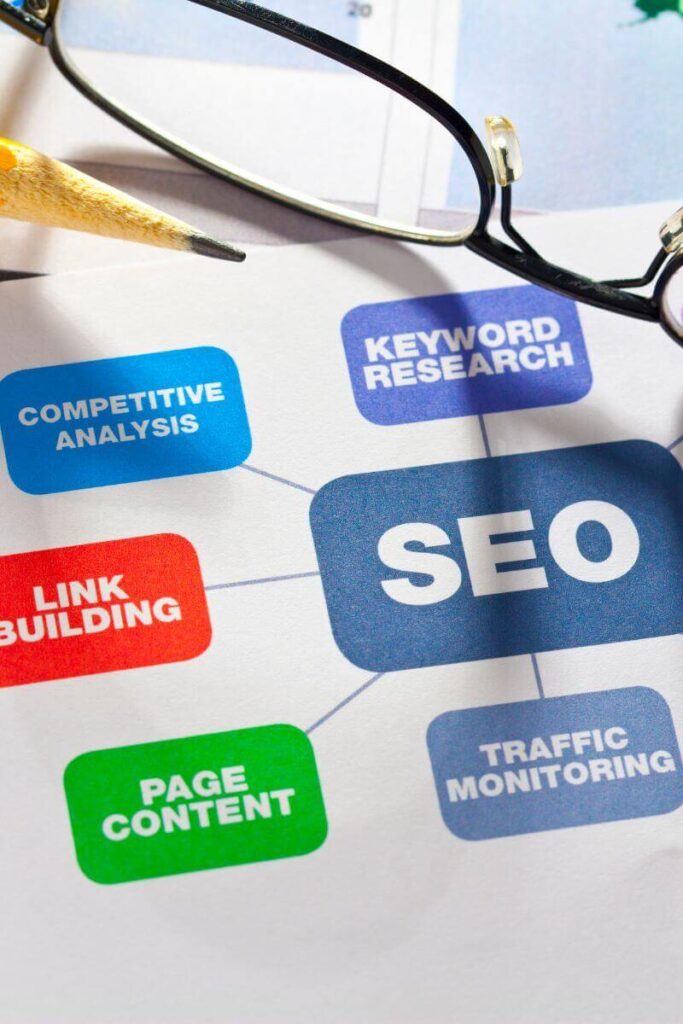
You may be wondering, what is SEO? In a nutshell, SEO (Search Engine Optimization) is the process of making your website visible on a search engine results page (SERP). The pandemic has taught us all that we absolutely have to learn how to navigate in a digital world. If you were a small business with a website, you were just happy to have the dang website done and up. Not once did you consider the elusive SEO; what SEO means, Why do you need SEO and how to find SEO bliss. We all remember the iconic line from the movie Field of Dreams. “If you build it, they will come” Many men and women have lived by this little catchphrase. I’m here to tell you that it’s not applicable when it comes to SEO.
I may earn a commission if you decide to make a purchase and sometimes if you just click on at link at no additional cost to you. Please read my disclosure page for more info.


The single most crucial aspect of why one must spend time on SEO is quite simple. You want to reach the first page of the Search Engine Results Page (SERP). You want to be on page one of Google when someone searches for your keywords. There is no magical button, but there is a solid foundation and formula for increasing your chances of landing on the first page. It’s achievable. When you take all the clutter away of what SEO is and what it isn’t- understanding how and why you implement it is half the battle.
What Is SEO
If you are a blogger, new or old, then chances are you have heard the term SEO. If you have not heard of SEO, then we have some catching up to do. A successful SEO campaign can result in more traffic to your website, better leads, and increased sales. SEO can be complex, but it doesn’t have to be.
The overall goal of SEO is to improve the visibility and ranking of a website or web page in search engine results pages (SERPs). You ultimately want to show up on page one of a google search.
There are a number of factors that can influence SEO, including site architecture, content, link popularity, and keywords. SEO is a complex and ever-changing field, but there are a few basic principles that any website can follow to improve their visibility in search results.
In this blog post, we will explore what SEO is, some of the core principles that can help improve your website’s ranking in search results, why it’s important, and some basic tips on how to get started with SEO for your website.
The Benefits of SEO
SEO can be a valuable tool for any business that is looking to reach a wider audience online. By optimizing your website for search engines, you can improve your visibility and attract more visitors. This, in turn, can lead to more customers and sales.
SEO can be used to achieve a variety of marketing goals, such as increasing brand awareness, driving traffic to your website, and improving conversion rates. And because SEO is a long-term strategy, it can provide ongoing benefits for your business.
There are many benefits to SEO, but some of the most notable ones include:
-Improved visibility and traffic
-Increased brand awareness
-More leads and sales
-Improved ROI
If you are looking for ways to improve your online presence, SEO is a great option to consider. As a matter of fact, it is the top option.
How To Optimize Your Site For SEO
If you want your site to rank high in search engine results, you need to optimize it for SEO. Search engine optimization is the process of making your site more visible and relevant to search engines. The better your SEO, the higher your site will rank in search results.
There are a number of things you can do to optimize your site for SEO. Here are a few tips:
– Use keyword-rich titles and descriptions
– Use relevant keywords throughout your site
– Create quality content that is informative and engaging
– Build links to your site from other high-quality websites
By following these tips, you can improve your site’s SEO and increase your chances of ranking high in search engine results.
The Different Types Of SEO
There are many different types of SEO (search engine optimization), and each one is important in its own way. Here are some of the most common types of SEO:
– On-page SEO: This type of SEO focuses on optimizing the content and structure of your website to make it more visible to search engines.
– Off-page SEO: This type of SEO focuses on building links to your website from other websites. This can help improve your website’s visibility on search engine results pages.
– Technical SEO: This type of SEO focuses on optimizing the technical aspects of your website, such as your website’s code and structure.
– Local SEO: This type of SEO focuses on optimizing your website for local search results. This can be especially important for businesses that serve a specific geographic area.
– Ecommerce SEO: This type of SEO focus on an online store. Writing details descriptions with relevant keywords for every product page is a good start.
No matter what type of SEO you’re doing, the goal is always the same: to improve your website’s visibility in search engine results pages (SERPs).
What to Avoid When Optimizing Your Site for SEO
When you’re trying to optimize your website for SEO, there are a few things you’ll want to avoid. First and foremost, don’t keyword stuff your content. This is when you stuff your content full of keywords in an attempt to game the system. Not only does this not work, but it will actually harm your SEO. Google will punish sites that engage in keyword stuffing, and your rankings will suffer as a result. Another thing to avoid is buying links. This is when you pay for links that point back to your website. This used to be a common practice, but it doesn’t work anymore. In fact, it will actually harm your website. Google has gotten better at detecting paid links, and they will penalize your site if they find them. So avoid buying links at all costs.
Another thing to avoid is using low-quality links. These are links from spammy websites or from websites that are not relevant to your site. Google can penalize you for having these kinds of links, so it’s best to avoid them altogether. Spammy link-building tactics include things like buying links, participating in link schemes, and using exact match anchor text. If you’re using any of these tactics, it’s time to stop. Not only are they against Google’s guidelines, but they won’t do anything to help your website in the long run.
Finally, avoid linking to bad neighborhoods. These are websites that are known for being spammy or for having a lot of low-quality content. If you link to these kinds of sites, it can reflect poorly on your own site.
So what can you do instead? Focus on building high-quality links from relevant and authoritative websites. This will take more time and effort, but it’s worth it if you want to avoid being penalized by Google.
Quick SEO Facts
Related Blogging Posts
Did you find this post enjoyable? Are you interested in receiving more tips on developing a money-positive mindset? Please leave a comment and be sure to save this post for future reference





